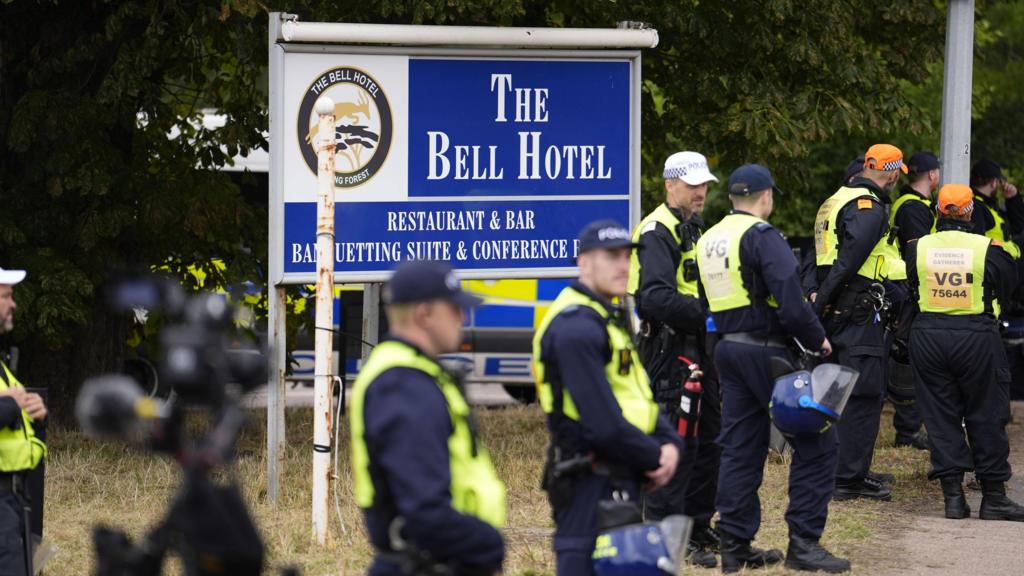Conservative leader Kemi Badenoch is reportedly encouraging councils under Tory control to explore legal challenges against the use of hotels for housing asylum seekers in their respective areas.
Badenoch cited Epping Forest District Council’s recent success as “a victory for local people,” referencing a High Court ruling that prevented a hotel from being used to accommodate asylum seekers.
In a letter addressed to Conservative council leaders, Badenoch stated, “We support you in taking similar action to protect your community… if your legal advice supports it.”
A Labour spokesperson responded to Badenoch’s letter, calling it “desperate and hypocritical nonsense from the architects of the broken asylum system.”
The Labour spokesperson further stated that under Conservative leadership, “the number of asylum hotels in use rose as high as 400.”
“There are now half that and there are now 20,000 fewer asylum seekers in hotels than at their peak under the Tories,” the spokesperson added.
This development follows Monday’s High Court decision to grant a temporary injunction to the Conservative-led Epping council, preventing the accommodation of migrants at The Bell Hotel in Essex.
The court has stipulated that approximately 140 asylum seekers must be relocated from the hotel by September 12, giving the government a limited timeframe to secure alternative housing.
Councils across England are reportedly considering similar legal challenges, prompting ministers to develop contingency plans for housing asylum seekers who will be removed from the Bell Hotel.
Historically, hotels have been reserved for short-term emergency situations when other accommodation options are unavailable for asylum seekers.
However, the use of hotels increased significantly during the Covid-19 pandemic, reaching a peak of 56,042 in 2023 under Conservative governance.
The Labour government has pledged to discontinue the use of migrant hotels by 2029, with plans to reduce small-boat crossings and expedite decisions on asylum claims.
As of the end of March, Home Office figures indicate that 32,345 asylum seekers were housed in hotels, a 15% decrease from the end of December.
In recent years, other councils have pursued legal action to close asylum hotels within their jurisdictions, though previous attempts have been unsuccessful.
Epping Forest District Council successfully argued that its case differed due to the hotel becoming a safety risk and violating planning laws by ceasing to operate as a conventional hotel.
The judge sided with the council, acknowledging “evidenced harms” related to protests surrounding the hotel, which included violence and arrests.
For other councils to follow suit, they would need to present the High Court with evidence of local harm.
On Wednesday, several councils, including some led by Labour, announced that they were evaluating their legal options.
In her letter, Badenoch advised Tory council leaders to “take formal advice from planning officers on the other planning enforcement options available to your council in relation to unauthorised development or change of use.”
Corina Gander, the Conservative leader of Broxbourne Council, stated that she was “expecting to go down the same path” as Epping Forest District Council by filing a legal challenge against an asylum hotel in her area.
Reform UK leader Nigel Farage has announced that all 12 councils controlled by his party will “do everything in their power to follow Epping’s lead.”
The leader of Reform UK-led West Northamptonshire Council said he was “considering the implications of this judgment to understand any similarities and differences and actively looking at the options now available to us”.
Carol Dean, leader of Labour-controlled Tamworth Council, stated that her authority had previously decided against legal action but was now “carefully assessing” what the decision might mean for the area.
She described it as a “potentially important legal precedent.”
Successful legal challenges could potentially increase pressure on the government to identify alternative housing solutions for migrants.
Shadow home secretary Chris Philp has stated that asylum seekers relocated from the hotel in Epping should not be placed in other hotels, flats, or house-shares.
In a letter to Home Secretary Yvette Cooper, he advocated for the use of alternative accommodation such as former military sites or barges.
Home Office Minister Dan Jarvis told the BBC the government was “looking at contingency options” for housing those being moved out of the Bell Hotel but gave no specific examples.
“There’s likely to be a range of different arrangements in different parts of the country,” Jarvis said.
In June, ministers announced that the government was exploring the purchase of tower blocks and former student accommodation to house migrants.
Sign up for our Politics Essential newsletter to keep up with the inner workings of Westminster and beyond.
The hotel has been the subject of some anti-immigration protests over the past 12 months.
Linden Kemkaran says she has also written to the Home Office to urge them to be “more transparent”.
It comes after the High Court temporarily blocked asylum seekers from being housed at a hotel in Essex.
The High Court ruling follows an unprecedented backlog in people waiting for a decision on their cases.
Asylum seekers living in The Bell Hotel must be removed from the building by 12 September.

